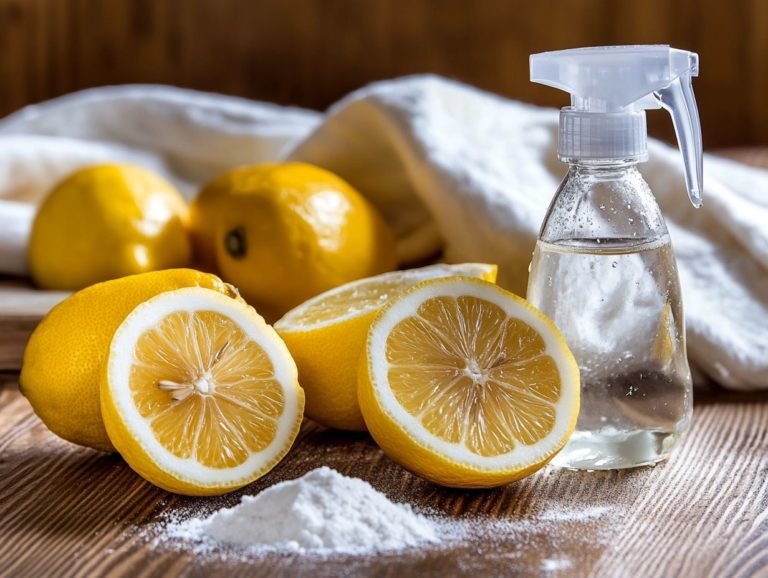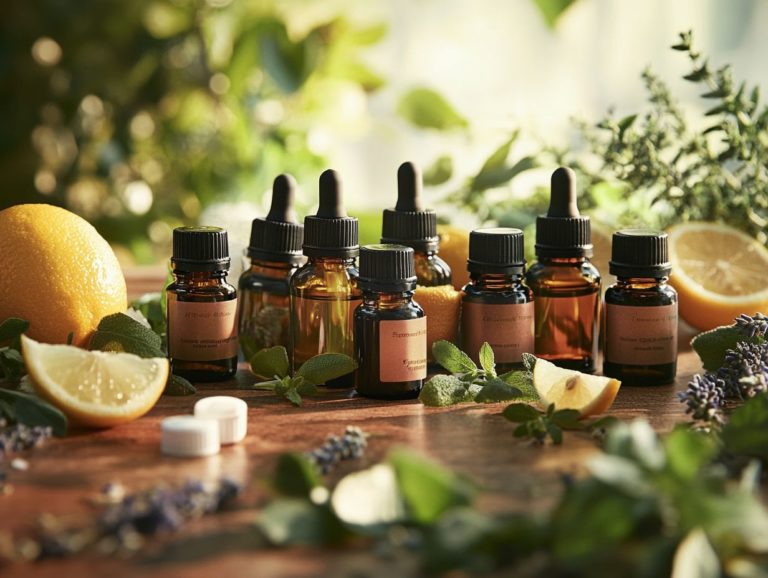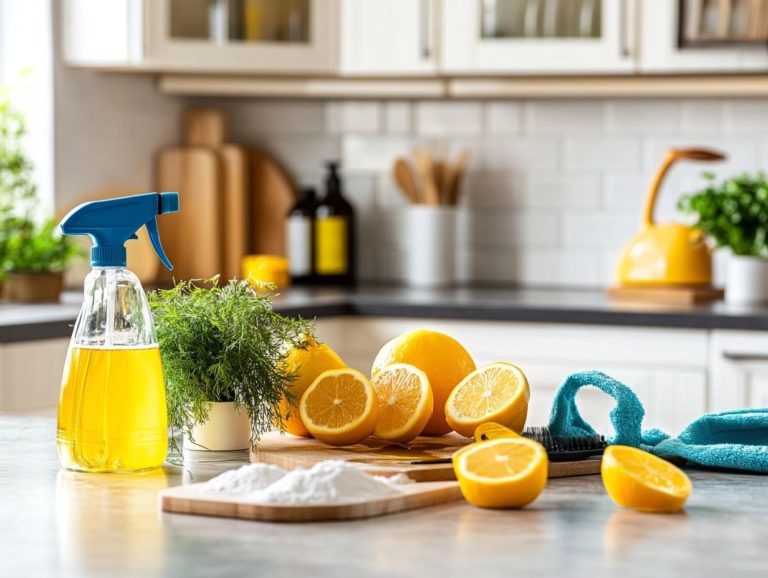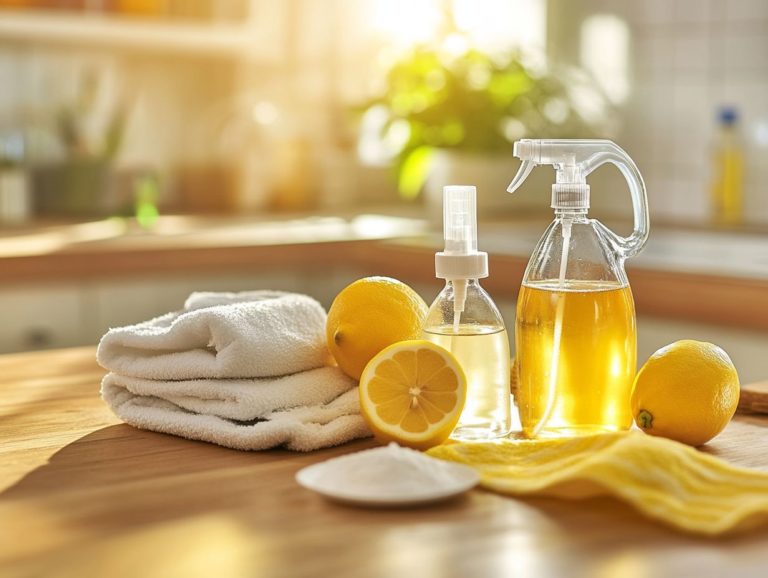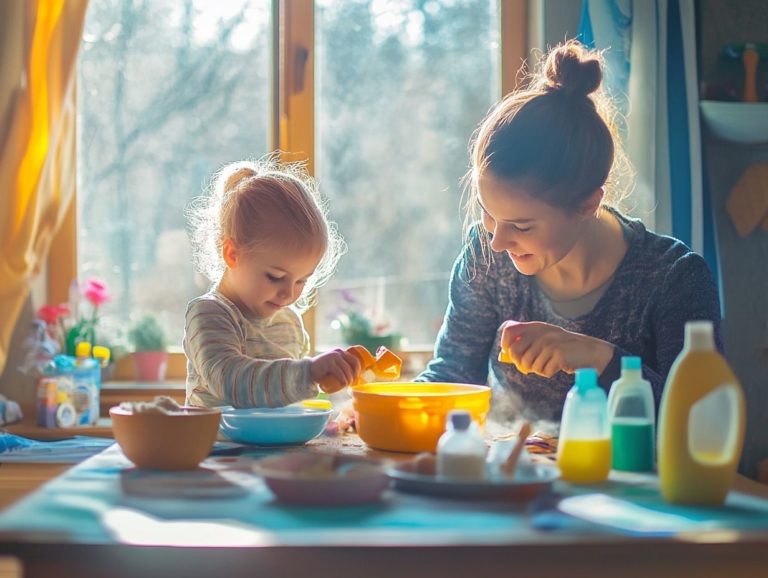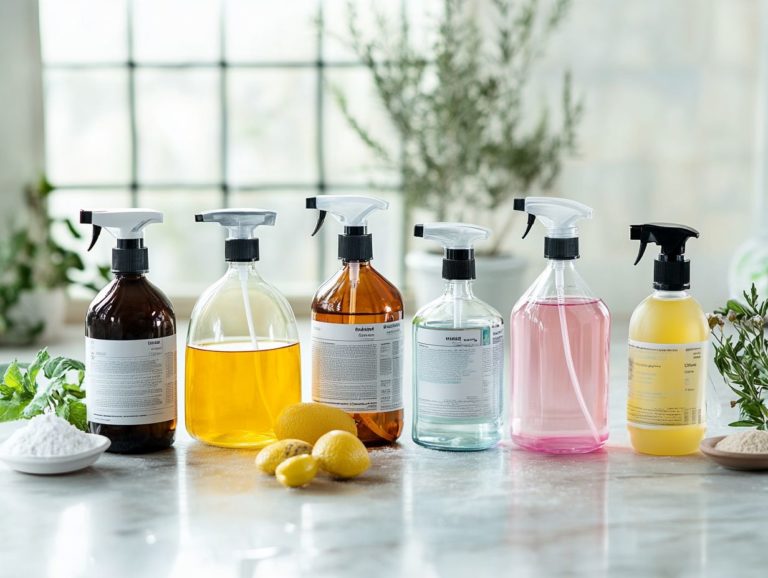How to Clean Without Harmful Chemicals?
In a world where health and environmental awareness are growing, you may reconsider your cleaning habits.
Conventional cleaning products often contain harmful chemicals that can jeopardize your well-being and the planet’s health.
This article explores compelling reasons for embracing chemical-free cleaning and identifies common toxins in your favorite products. It also provides practical tips for selecting safer alternatives, including using natural cleaning products and nontoxic ingredients.
You’ll uncover natural cleaning solutions that you can effortlessly whip up in your own kitchen.
Explore this journey to discover how you can cultivate a cleaner, healthier living space without sacrificing safety or sustainability. Consider integrating refillable cleaning supplies and low waste cleaning methods into your routine.
Contents
- Key Takeaways:
- Why Should You Consider Cleaning Without Harmful Chemicals?
- What Are The Most Common Harmful Chemicals Found In Cleaning Products?
- How To Choose Non-Toxic Cleaning Products?
- What Are Some Natural Alternatives To Chemical Cleaners?
- How To Make Your Own Non-Toxic Cleaning Products?
- Frequently Asked Questions
- How to Clean Without Harmful Chemicals?
- What are some natural alternatives to chemical cleaning products?
- Why should I switch to using natural cleaning products?
- How can I safely clean without using bleach?
- Can essential oils be used for cleaning?
- What are some tips for a successful transition to using natural cleaning products?
Key Takeaways:
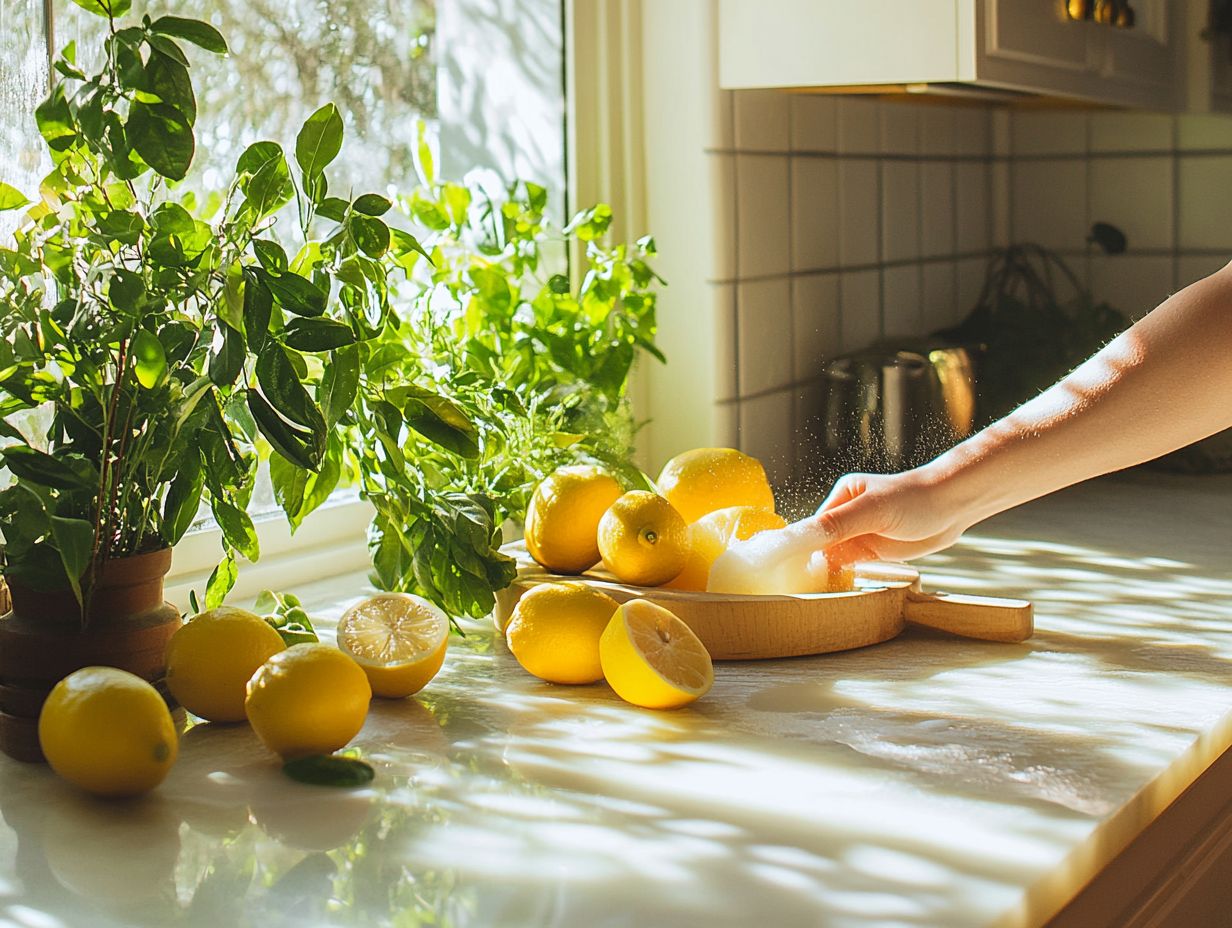
- Choose non-toxic cleaning products to protect your health and the planet!
- Beware of harmful chemicals like phthalates, PERC, triclosan, ammonia, and chlorine.
- Look for trusted certifications and ingredient lists. Brands like Thrive Market, Blueland, and Branch Basics provide excellent eco-friendly options!
Why Should You Consider Cleaning Without Harmful Chemicals?
Cleaning your home without harmful chemicals not only fosters a healthier environment for your family but also plays a crucial role in nurturing a more sustainable future.
By choosing natural cleaning products and nontoxic solutions, you can significantly minimize your exposure to the harmful chemicals commonly found in many traditional household cleaners. These eco-friendly alternatives, often crafted from biodegradable ingredients, deliver impressive cleaning power without compromising your well-being. Brands like Puracy, ECOS, and Attitude are known for their nontoxic cleaning and sustainable manufacturing practices.
It s now easier than ever to embrace DIY cleaning solutions and greener alternatives, enabling you to cultivate a safe and inviting eco-friendly home that prioritizes both health and sustainability.
What Are The Most Common Harmful Chemicals Found In Cleaning Products?
Understanding harmful chemicals in cleaning products is crucial for your family’s health. Take action now by choosing safer, nontoxic alternatives!
Substances like Triclosan, ammonia, and chlorine are frequently found in many traditional cleaning agents, and they come with serious health risks, including respiratory issues and skin irritations.
The Environmental Working Group has flagged these chemicals as potential environmental hazards, encouraging you to seek out safer, nontoxic alternatives. By identifying these harmful ingredients, you can confidently avoid products that jeopardize both your health and the environment. Look for environmentally safe products and zero waste options to further reduce your ecological footprint.
1. Phthalates
Phthalates are a group of chemicals commonly used to enhance the flexibility and durability of plastics, but they also lurk in many household cleaning products, presenting significant health risks.
These substances often make their way into your home through everyday items like air fresheners, detergents, and surface cleaners, potentially exposing everyone in your household especially vulnerable individuals such as children and pregnant women. The health implications are particularly concerning, as phthalates have been linked to reproductive and developmental issues, contributing to hormonal imbalances that can impact fertility and child development.
Given growing awareness about these hazards, you may find yourself actively seeking out phthalate-free alternatives. Fortunately, brands like Seventh Generation, Method, and Grove Collaborative are leading the charge by providing eco-friendly household cleaners that prioritize nontoxic ingredients, ensuring that safer choices are not only accessible but also effective for keeping your home clean. These brands utilize sustainable manufacturing practices to offer the best natural cleaners for a safe home environment. Additionally, opt for refillable cleaning supplies to minimize waste and support a sustainable lifestyle.
2. Perchloroethylene (PERC)
Perchloroethylene, or PERC, is a solvent commonly found in dry cleaning products. It has a reputation for harming both human health and the environment.
When you’re exposed to PERC, you might experience dizziness, headaches, and even long-term neurological issues. This raises eyebrows for anyone searching for chemical-free shampoos and cleaning solutions.
The rise of sustainable cleaning brands has led to safer, PERC-free alternatives that focus on health without compromising effectiveness. Brands such as Cleancult and Norwex offer effective and eco-conscious cleaning products.
As awareness of these hazards increases, many consumers are actively seeking brands that have removed PERC from their products. More people are choosing eco-friendly cleaning solutions, and you can join this positive change!
Consider brands like Seventh Generation and Method, which provide effective cleaning options that harness the natural power of ingredients such as vinegar, baking soda, and essential oils. Some companies even have enzyme-based cleaners that tackle stains and dirt without harsh chemicals.
Make the switch today! Choose these safer alternatives to create a healthier home and environment while maintaining an impeccable standard of cleanliness. Seek out companies like Dropps and Common Good for more safe cleaning methods and environmentally safe products.
3. Triclosan
Triclosan is a chemical used to kill bacteria. You can find it in many household cleaners, hand sanitizers, and personal care products. Its widespread use raises significant concerns about potential health risks.
This harmful chemical has been linked to antibiotic resistance and endocrine disruption. Organizations like the Environmental Working Group recommend steering clear of products that contain Triclosan.
As awareness about nontoxic cleaning solutions grows, you may find yourself seeking alternatives that are effective yet free from harmful ingredients. Brands like Branch Basics and Package Free offer products that meet these criteria.
With communities increasingly scrutinizing the safety of everyday products, there s a rising demand for transparency in ingredient labeling. Advocacy efforts by organizations such as the Environmental Working Group educate the public about the dangers associated with Triclosan. They encourage both consumers and manufacturers to prioritize health over convenience.
In response to this shift, various nontoxic alternatives have emerged, including:
- Vinegar-based cleaners
- Baking soda
- Essential oil formulations
These alternatives not only tackle grime effectively but also safeguard your well-being and that of the planet. By making informed choices, you can contribute to a healthier lifestyle and a sustainable future. Consider integrating organic skincare products and chemical-free shampoos into your routine for an overall nontoxic lifestyle.
4. Ammonia
Ammonia is a staple in many household cleaners, celebrated for its remarkable ability to cut through grease and grime. However, it comes with significant health risks that you cannot afford to ignore.
Exposure to ammonia can irritate your skin, eyes, and respiratory tract, especially in poorly ventilated spaces. This reality underscores the importance of exploring eco-friendly alternatives.
With an increasing demand for safer cleaning options, brands are stepping up, offering ammonia-free products that provide impressive cleaning power while prioritizing your safety.
These alternatives not only minimize your risk of harmful exposure but also foster a healthier indoor environment. Many consumers are now gravitating toward plant-based cleaning solutions that effectively tackle dirt and stains just as well as traditional cleaners.
For instance, brands like Mrs. Meyer’s Clean Day and Method present a diverse range of ammonia-free cleaning products that leverage the effectiveness of natural ingredients like vinegar and essential oils.
By choosing these options, you can effortlessly maintain a clean home while protecting the health of your family and pets. Embracing these eco-friendly alternatives is not just a savvy choice; it s a meaningful step toward sustainable living and improved indoor air quality.
5. Chlorine
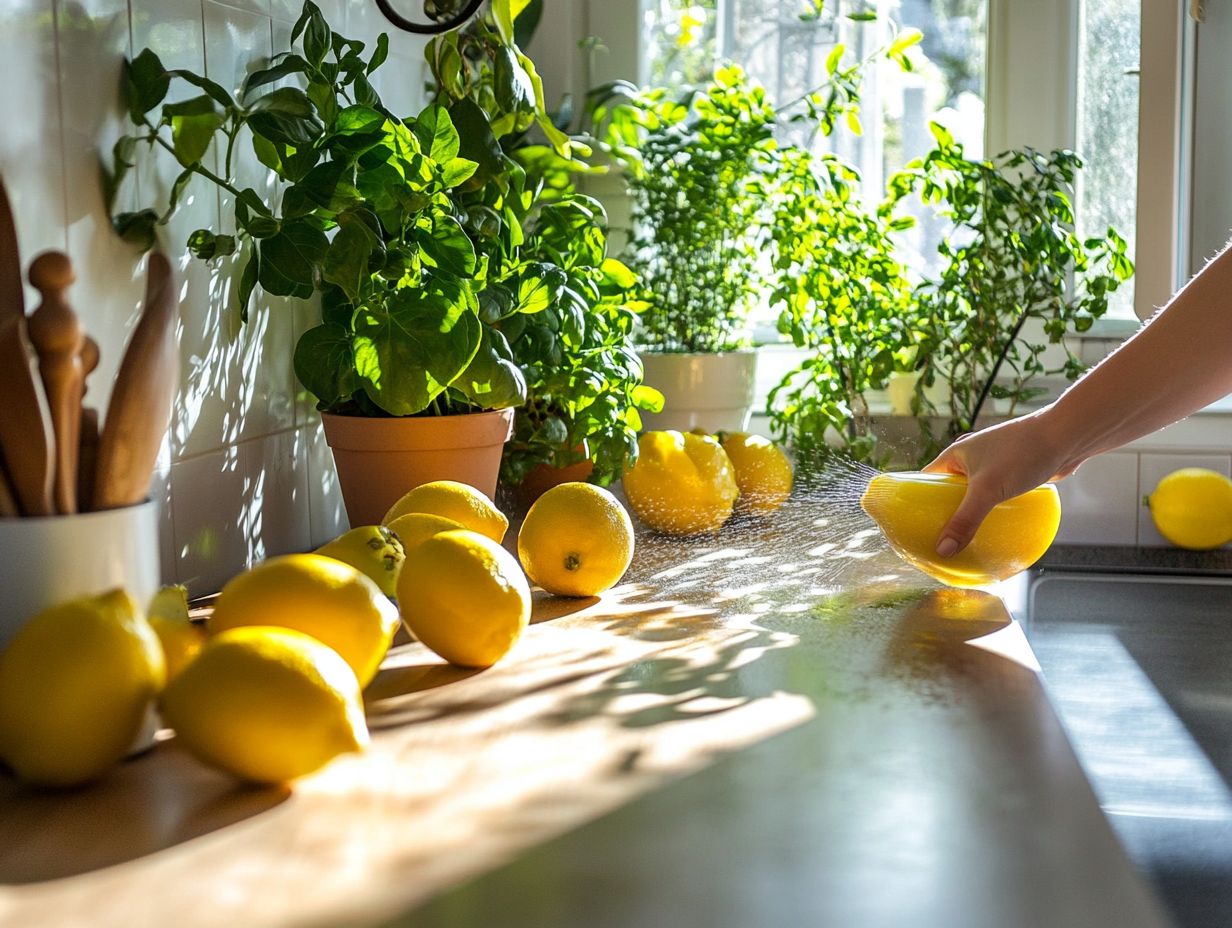
Chlorine is a potent disinfectant often found in many cleaning products. It is prized for its ability to eliminate germs and bacteria. However, its use carries significant health and environmental risks. Inhaling chlorine fumes can lead to respiratory issues. The presence of this chemical in cleaning products raises serious concerns about human health and the health of our environment.
As you become more aware of these risks, you may find yourself joining the growing demand for biodegradable cleaning products and eco-friendly household solutions. These alternatives offer effective cleaning without the hazards associated with chlorine.
Chlorine compounds can persist in waterways and trigger harmful chemical reactions. These reactions can jeopardize aquatic life and disrupt delicate ecosystems. Embracing non-toxic cleaning solutions addresses these environmental challenges and reflects a commitment to fostering a healthier indoor environment.
Many companies are stepping up to offer safer alternatives. They provide products made from plant-based ingredients and essential oils that clean effectively while being safer for users and the planet. Brands such as Common Good and Package Free offer zero waste options and essential oils for cleaning.
This transition represents a pivotal move towards sustainable cleaning practices that prioritize safety without sacrificing effectiveness. Consider using greener cleaning alternatives from Seattle-based companies like Jennifer Troyer’s Thrive Market.
How To Choose Non-Toxic Cleaning Products?
Choosing non-toxic cleaning products is essential to create a safe and healthy home. Begin by seeking out products that boast recognizable certifications and labels. These signify compliance with rigorous safety and environmental standards. Look for biodegradable cleaning products that reduce waste and support sustainable manufacturing practices.
Take the time to examine the ingredients list for nontoxic components. Familiarize yourself with sustainable cleaning brands that prioritize both health and eco-friendliness in their formulas. Brands like Thrive Market, Grove Collaborative, and Blueland are excellent examples. By making informed choices, you can create a cleaning routine that is effective and safe for your family and the planet.
1. Look For Certifications And Labels
When selecting non-toxic cleaning products, one effective strategy is to seek out certifications and labels that signify safety and environmental responsibility. Certifications from reputable organizations, like the Environmental Working Group (EWG), assure you that a product has undergone thorough scrutiny for harmful chemicals and adheres to rigorous safety standards. By prioritizing products with these certifications, you can confidently make healthier choices for your household, including opting for chemical-free shampoos and organic skincare products.
Various certifications, such as Green Seal, USDA Organic, and Safer Choice labels, add credibility by emphasizing environmentally friendly practices. These labels inspire consumer trust and act as benchmarks for manufacturers, motivating them to develop safer products.
When you identify non-toxic labels, navigating the overwhelming array of choices on store shelves becomes easier. You can ensure you select solutions that protect both your health and the planet. Organizations like EWG play a crucial role in educating the public, showing how informed decisions can lead to a more sustainable lifestyle.
Join the movement towards a greener home today!
2. Read The Ingredients List
Reading the ingredients list of cleaning products is crucial. This helps you identify harmful chemicals and choose nontoxic alternatives for your eco-friendly home.
Look for clear labels that highlight the absence of harmful substances like phthalates, Triclosan, and chlorine. Opt for products that showcase nontoxic ingredients such as essential oils and plant-based components.
Consider natural laundry detergents and household cleaners that follow these guidelines. This practice enables you to make informed choices that prioritize your health and the environment.
Being aware of what goes into your cleaning products can significantly reduce your exposure to allergens and irritants. Examine labels carefully and seek out products with recognizable ingredients.
Natural elements like vinegar, baking soda, and lemon are excellent indicators of a safe choice. These ingredients are often found in some of the best natural cleaners.
Be cautious of vague terms like “fragrance” or “cleaning agents.” These often mask harmful components. By selecting products with transparent, wholesome ingredients, you embrace a healthier lifestyle while minimizing your ecological footprint.
3. Research The Brand And Company
Researching the brand and company behind your cleaning products is essential. This ensures their commitment to sustainability and safety.
Seek companies that prioritize transparency in their manufacturing processes and use eco-friendly materials. Brands like Branch Basics, Attitude, and Cleancult are known for these practices.
Support sustainable cleaning brands with a reputation for ethical practices. Your choices can significantly impact the demand for safer products and promote a healthier environment in your home.
Take time to scrutinize labels, read customer reviews, and evaluate any certifications the brand may hold. Certifications like Green Seal or USDA Organic indicate a brand’s dedication to environmentally friendly practices.
Consider brands that offer low waste cleaning and refillable supplies to further reduce your ecological footprint. Brands like Seventh Generation, Method, and Mrs. Meyer’s frequently receive praise for their sustainable approaches.
By opting to support these companies, you re contributing to a greener planet. You re also encouraging other manufacturers to adopt similar ethical practices, raising the standard across the industry.
What Are Some Natural Alternatives To Chemical Cleaners?
You have many natural alternatives to chemical cleaners available. These options allow you to maintain a pristine home without risking your health.
Ingredients such as:
- Vinegar
- Baking soda
- Lemon juice
These are powerful cleaners that tackle everything from stubborn stains to unwanted odors with remarkable ease.
Incorporating essential oils into your DIY cleaning solutions boosts their effectiveness and fills your space with delightful aromas. Embrace these natural options to create a cleaner, safer environment in your home.
By significantly reducing your dependency on harmful chemicals, you re making a positive change. Adding zero waste options and DIY cleaning solutions can help you maintain a sustainable lifestyle.
1. Vinegar
Vinegar stands out as one of the most versatile and effective natural cleaners you can find. It s a must-have in any eco-friendly household. Thanks to the main ingredient in vinegar, it effortlessly breaks down grime and disinfects surfaces without resorting to harsh chemicals.
Whether you re cleaning windows or deodorizing carpets, vinegar serves as an affordable, nontoxic alternative to traditional cleaning products. Its effectiveness knows no bounds, especially when it comes to kitchen and bathroom surfaces. A simple mixture of vinegar and water can conquer even the toughest grease and soap scum.
For refreshing fabrics, combine vinegar with baking soda to create a powerful deodorizing spray that banishes odors from upholstery and carpets. Using vinegar to tackle mineral deposits from faucets and showerheads is another savvy way to keep your home spotless while being kind to the planet!
This aligns with the safe cleaning methods advocated by brands like Dropps and Puracy.
2. Baking Soda
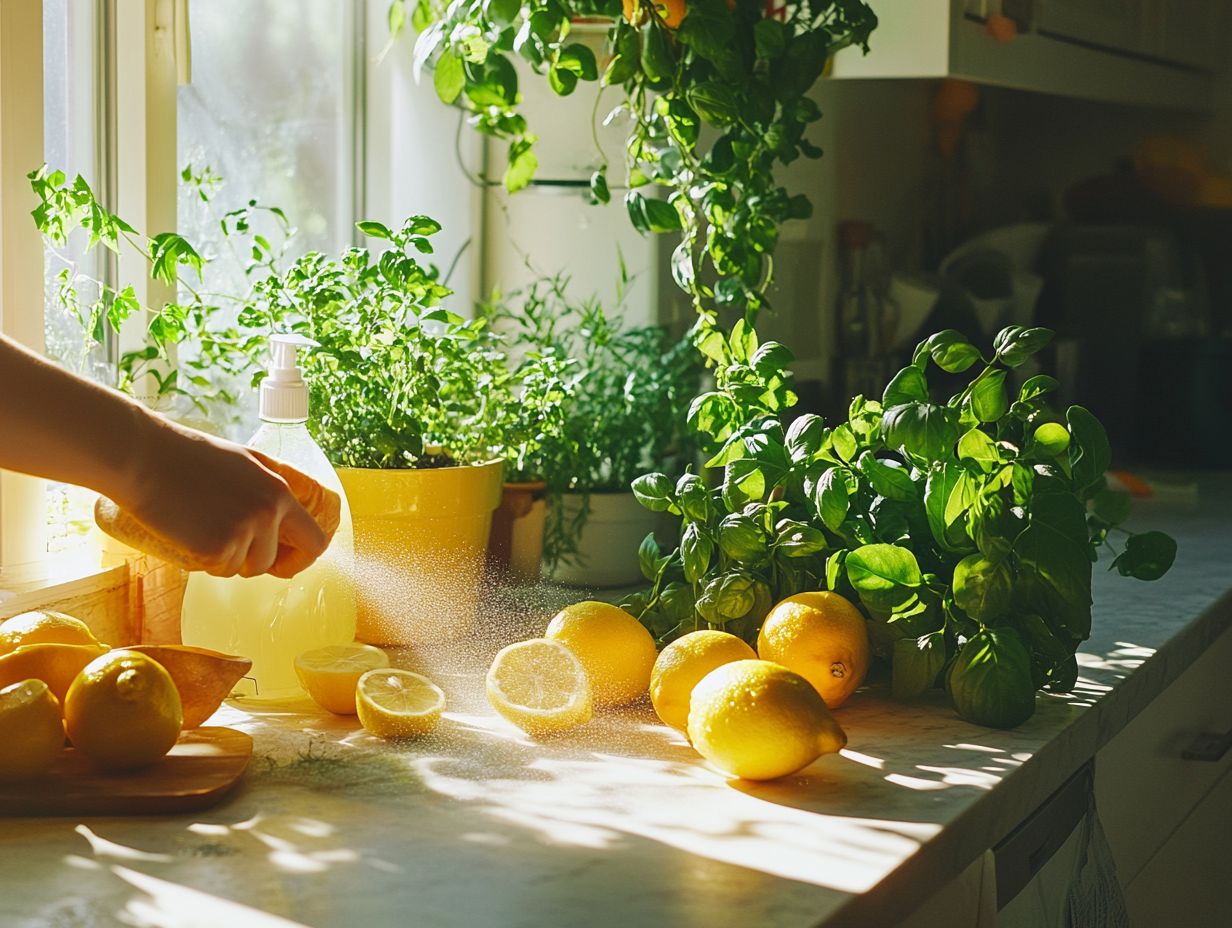
Baking soda is your secret weapon in natural cleaning. It s renowned for its remarkable deodorizing abilities and prowess in combating stubborn stains. It s the must-have ingredient in your cleaning arsenal.
This incredibly versatile compound can scrub surfaces with ease, freshen up carpets, and even unclog drains. It offers a potent alternative to chemical-laden products cluttering your cabinets. By adding baking soda to your cleaning routine, you elevate the effectiveness of your efforts while fostering a healthier home environment.
Brands like ECOS and Norwex promote the use of baking soda in their environmentally safe products. Beyond these uses, baking soda s mild abrasive qualities make it perfect for polishing surfaces, from your kitchen countertops to bathroom fixtures.
To make a cleaning paste: Mix baking soda with water for a gentle yet powerful scrub. You can also combine it with vinegar to create a bubbly reaction that lifts grime effortlessly.
When deodorizing, sprinkle baking soda on your carpets before vacuuming to eliminate odors, and place an open box in the refrigerator to keep food smells at bay. By utilizing these straightforward techniques, you can unlock the full potential of this affordable and eco-friendly cleaning agent.
3. Lemon Juice
Lemon juice is another secret weapon in natural cleaning. It’s celebrated for its antibacterial properties and delightful aroma. This refreshing cleaner deserves a prime spot in your cleaning arsenal.
Thanks to the citric acid it contains, lemon juice effortlessly tackles stains, cuts through grease, and neutralizes unpleasant odors. It s a stellar alternative to harsh chemical cleaners. Plus, it has a brightening effect that enhances the appearance of surfaces, leaving your home clean and wonderfully fragrant.
Its versatility shines in various tasks. Whether you’re brightening countertops, cutting boards, or tackling fabric stains, lemon juice is invaluable. For instance, mix lemon juice and vinegar for a formidable cleaner that banishes tough soap scum in your bathroom.
If your microwave could use a little TLC, just mix lemon juice with water, heat it up, and watch as grime loosens for an effortless wipe-down.
You can even whip up a natural air freshener by combining lemon juice with baking soda and water, effectively eliminating odors while leaving behind a refreshing scent. These straightforward DIY recipes make lemon juice an essential solution for effective, eco-friendly cleaning.
Start using these eco-friendly cleaners today and experience the difference for yourself!
4. Essential Oils
Essential oils are concentrated plant extracts that not only provide delightful natural fragrances but also offer a range of antibacterial properties. This makes them excellent additions to your cleaning routine. Oils like tea tree, lavender, and eucalyptus can elevate your DIY cleaning solutions, enhancing their effectiveness while leaving a refreshing aroma throughout your home. These are among the best essential oils for cleaning.
By incorporating essential oils into your cleaning regimen, you can enjoy a cleaner space that also promotes relaxation and well-being.
Plus, lemon and peppermint oils are renowned for their invigorating scents and powerful cleansing abilities. Lemon oil is particularly adept at cutting through grease, leaving surfaces sparkling, while peppermint oil refreshes the air and serves as a natural disinfectant.
To harness the power of essential oils in your DIY cleaning solutions, simply add a few drops to a spray bottle filled with water and a splash of vinegar or baking soda. This creates an all-natural cleaner that not only tackles grime but also fills your home with uplifting fragrances. Feel free to experiment with different oil combinations to discover unique scents and enhanced cleaning benefits that suit your preferences.
How To Make Your Own Non-Toxic Cleaning Products?
Making your own non-toxic cleaning products is easy. This gives you control over what goes into them.
By leveraging the abilities of natural ingredients like vinegar, baking soda, and essential oils, you can craft effective DIY cleaning solutions that are safe for both your family and the environment.
This process eliminates harmful chemicals from your home and embraces a more sustainable approach to cleaning, perfectly aligning with your values of health and eco-friendliness.
1. All-Purpose Cleaner
An all-purpose cleaner is your go-to solution for a wide range of cleaning tasks throughout your home. This makes it an essential component of any eco-friendly household. By blending simple natural ingredients like vinegar, water, and essential oils, you can whip up an effective DIY all-purpose cleaner that avoids harmful chemicals.
This homemade cleaner is perfect for use on countertops, appliances, and even floors, offering a safe and sustainable alternative for your everyday cleaning needs.
Reducing waste and minimizing your exposure to toxic substances often found in commercial cleaners is a significant benefit. The process is refreshingly simple: just mix one cup of distilled white vinegar with one cup of water and add about ten drops of your favorite essential oil for a delightful fragrance. For more tips, check out this guide on how to clean your home without harsh chemicals.
Shake well before use and pour the mixture into a spray bottle for hassle-free application. If you re dealing with stubborn grease, a sprinkle of baking soda or a splash of lemon juice can amp up the potency of your cleaner.
By embracing these natural ingredients, you re not just cleaning your home; you re adopting a customizable approach that promotes a healthier lifestyle.
2. Glass Cleaner
Creating your own glass cleaner is not only straightforward but also a great way to steer clear of harsh cleaning chemicals. By mixing equal parts vinegar and water, you can whip up a potent DIY glass cleaner that leaves your windows and mirrors gleaming with a streak-free shine.
This natural solution cleans brilliantly and supports your eco-friendly lifestyle, removing the need for harsh cleaning chemicals.
The acetic acid in vinegar, a natural ingredient found in vinegar, acts as a natural disinfectant, effortlessly breaking down grime and banishing odors without causing harm to the environment. To amplify its cleaning power, consider adding a few drops of dish soap or essential oils, like lemon or tea tree, for a delightful fragrance.
For that flawless finish, reach for a microfiber cloth; it absorbs moisture beautifully and minimizes the risk of lint sticking to surfaces. When dealing with various glass surfaces, remember that a stronger vinegar concentration is particularly effective for tackling tough spots, while a diluted version works wonders for gentle cleaning on delicate items like eyeglasses or screens.
Regularly using this DIY cleaner will not only brighten your glass fixtures but also contribute to a healthier living space overall.
3. Bathroom Cleaner
A homemade bathroom cleaner can be your secret weapon against grime, soap scum, and mildew. This cleaner is made without harmful chemicals.
By blending baking soda, vinegar, and essential oils, you can craft a powerful DIY bathroom cleaner. It leaves your surfaces sparkling and fresh.
Baking soda acts as a mild abrasive for scrubbing surfaces. Vinegar cuts through soap scum and mineral deposits due to its acidic nature.
Essential oils, like tea tree or lavender, add a pleasant scent and help fight bacteria and mold.
To make this cleaner, combine one cup of baking soda, one cup of vinegar, and ten drops of your chosen essential oil in a spray bottle. Shake gently until mixed.
Spray generously on the area you want to clean. Let it sit for a few minutes before wiping with a cloth or sponge for that pristine, refreshed look.
4. Laundry Detergent
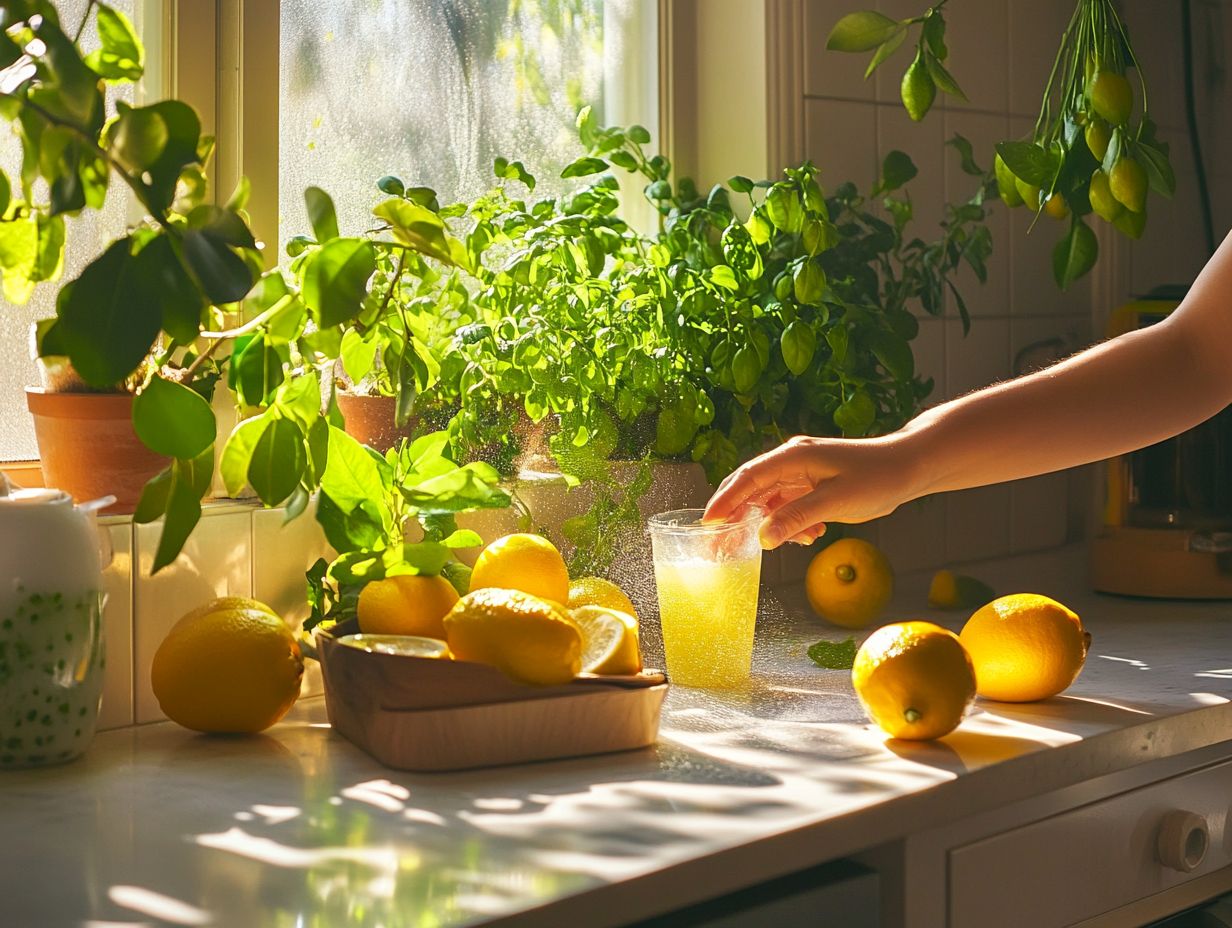
Making your own laundry detergent is a fantastic way to avoid harmful chemicals. Your clothes will come out fresh and clean.
Combine washing soda, grated soap, and essential oils to create a safe and effective detergent. This method supports a sustainable lifestyle by using natural ingredients.
This homemade solution is gentle yet powerful. You can customize it to fit your family’s unique needs.
- 1 cup of grated soap
- 1 cup of washing soda
- 1 cup of borax
Mix these ingredients well and store them in an airtight container. For added delight, infuse your detergent with essential oils like lavender or tea tree.
Essential oils provide a pleasant scent and enhance stain-fighting capabilities. You can even add baking soda to boost your cleaning power.
Frequently Asked Questions
How to Clean Without Harmful Chemicals?
Cleaning without harmful chemicals is simple and safe! Here are some steps to get you started:
What are some natural alternatives to chemical cleaning products?
Vinegar, baking soda, and lemon juice are great natural cleaners. They can effectively remove dirt and grime without harsh chemicals.
Why should I switch to using natural cleaning products?
Harmful chemicals in traditional cleaning products can irritate your skin and lungs. They can also trigger allergies and harm the environment.
How can I safely clean without using bleach?
Use hydrogen peroxide or white vinegar instead of bleach. Both are effective at killing germs and disinfecting surfaces.
Can essential oils be used for cleaning?
Absolutely! Essential oils like tea tree, lavender, and eucalyptus have natural germ-fighting properties. They can be added to DIY cleaning solutions for freshness.
What are some tips for a successful transition to using natural cleaning products?
Start by replacing one chemical cleaning product with a natural alternative at a time. Try different homemade cleaning recipes to find what works best for you.

